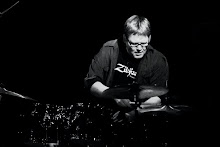Hello folks!
The Oxford EnglishDictionary defines the word ego as "self" or "self esteem". Indeed, every musicians needs some ego to survive. Too much ego, however, can create a lot of problems for us.
Today, I'm going to look at ego and our relationship with it.
I mentioned that we all need a certain amount of ego as musicians, especially when it's defined as self esteem. Musicians (especially improvising ones) put themselves in a place involving a lot of uncertainty when performing in a live situation. Think of all the variables that we don't have control over. The sound of the room, the listening and playing abilities of the people we're performing with, sometimes we're playing on instruments we haven't played before etc. We can practise, get to know the music we're performing really well and check out the sound of the room (in fact these are very good ways to feel more comfortable) but there will always be unknown factors. That's one of the great, eternal challenges of live performance. Our ego, our sense of self helps us make the leap of faith to know that whatever happens, the performance will occur. If we make a mistake (and there can be a lot of debate as to what a mistake is) our careers won't be over and the sun will rise the next day. In other words, our ego helps us put ourselves out there and be commited to our performance. In fact, I find the least successful improvisers are the ones who let their fear of failure keep them from playing confidently. If we play like we believe in ourselves, the audience will hear that belief, much more than specific notes or patterns.
One way to work on this belief and healthy use of ego (besides knowing music and your instrument as well as you can) is through affirmations. Affirmations can be thought of as ideas that are on their way to becoming true. You can work on saying these affirmations to yourself and, like anything you practise, you'll get better at it the more you do it. They can be any sort of positive message but I can give you 3 examples to get you started.
1. I (your name here) am a great musician.
2. You (your name here) are a great musician.
3. He/She (your name here) is a great musician.
You can write these to yourself, and also trying saying them, both out loud and in your mind.I like putting the affirmations in first, second, and third person becuase it's a way of receiving the message at a distance and sometimes works through the disbelief we feel when we first hear the message. This is an important point. Most people are so used to sending themselves negative messages (guilty as charged!) that they don't believe the affirmations at first. That's okay because our mind works in a funny way. Our mind will eventually believe what we tell it the most and steer ourselves in directions that will prove what we've told it. So, if I keep telling myself that I suck I will eventually believe it to be true and will probably look for ways of proving it. Any opinion about our abilities as musicians (including our own) are just that. Opinions, not facts. So why not work on the opinion that will benefit ourselves the most? Affirmations are free, can be used anywhere, and apart from maybe making us feel a little silly when we start, definitely won't hurt us. So give them a shot and you might be surprised at the result.
So we've established that as musicians, we need a certain amount of ego. Not enough and we won't have the confidence to perform. Too much ego, however, and we'll have difficulty as well.
We need to be constantly honestly assessing our abilities if we want to improve. Some ways of doing this are:
1) Recording ourselves and listening in a critical but objective way. Listen to yourself and pretend it's someone else. What do you like and want to hear more of? What do you not like and want to hear less of? Don't get judgmental and negative about it. That's unhealthy ego stuff. Be honest and dispassionate about it and you'll improve your playing quickly.
2) Don't take criticism from other musicians personally. If they say they'd like a tune to have a feel like a famous drummer, try and incorporate some of that player's good qualities without getting defensive. If the other players are accomplished instrumentalists and decent human beings, they are trying to help you.
Anyway, throughtout our careers we will all run into the issues of too much or not enough ego. it's just another part of the long journey any musician goes through. As always, put everything you can into the music and go from there.
To conclude: Go and check out any Peter Donald, especially when he's playing drums with John Abercrombie's quartet (I'm writing this on my Mom's computer and can't seem to post any videos). You won't hear any negative ego stuff, just a lot of great music!
Sunday, July 10, 2011
Subscribe to:
Post Comments (Atom)

thank you, great article!
ReplyDelete